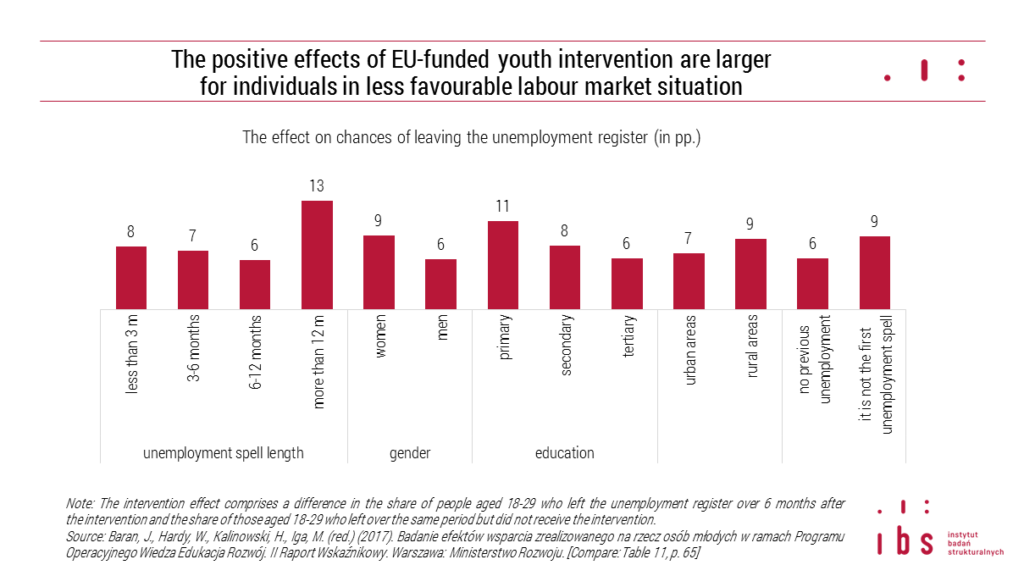The report constitutes an assessment of the effectiveness of support provided to the NEET youth, i.e. people aged 15-29, not in employment, not in education and not in training. The support was provided under Priority Axis I of the Operational Programme Knowledge Education Development. The report consists of three analyses:
- the outcome indicator survey for which the situation of individuals is analysed 6 months after the end of participation in the Programme – this is the second edition of this study;
- the panel study of respondents who participated in the first indicator survey in the previous year and were surveyed again 18 months after the end of participation in the Programme;
- the analysis of net effectiveness of support, which used administrative data from the unemployment register (i.e. a comparison of the outcomes among unemployed who participated in the Programme and among a similar group of unemployed who did not receive the support).
The evaluation indicates that the Programme participants were more likely to leave the unemployment register than other individuals registered in the Local Labour Offices (LLO). 60% of the programme participants were working six months after receiving support (14% participants became self-employed) and 28% of participants were in education or training. Intervention outcomes were long-lasting – 87% of the individuals maintained their jobs, 82% continued their own businesses, and 70% continued education 18 months after receiving the support. The intervention was most beneficial to people in less favourable labour market situations: the long-term unemployed, people with low education levels and people living in rural areas.

You can find more details in the report:
Baran, J., Hardy, W., Kalinowski, H., Magda, I. (ed.) (2017). Badanie efektów wsparcia zrealizowanego na rzecz osób młodych w ramach Programu Operacyjnego Wiedza Edukacja Rozwój. II Raport Wskaźnikowy. Warszawa: Ministerstwo Rozwoju. -> read the summary in English (pp. 10-12),
and related materials:
- information brochure -> download
- summary prepared by the Institute for Structural Research (IBS) -> below
***
This publication is the second of a planned series of five reports of outcome indicators measurements under the project “Evaluation of support provided for young people under the Operational Programme Knowledge Education Development (OP KED)” commissioned by the Polish Ministry of Economic Development, financed from the European Social Fund. The project is realised by the consortium: Institute for Structural Research (IBS), IMAPP and IQS.
Related documents:
- Information brochure -> download
- First report of outcome indicators measurement:
Baran, J., Kalinowski, H., Leszczyńska, B., Lis, M. (ed.) (2016). Badanie efektów wsparcia zrealizowanego na rzecz osób młodych w ramach Programu Operacyjnego Wiedza Edukacja Rozwój. I Raport Wskaźnikowy. Warszawa: Ministerstwo Rozwoju. -> read the summary in English (information brochure -> read) - First subject report:
Ministerstwo Rozwoju (2015). Badanie efektów wsparcia zrealizowanego na rzecz osób młodych w ramach Programu Operacyjnego Wiedza Edukacja Rozwój. I Raport Tematyczny. Warszawa: Ministerstwo Rozwoju. -> read the summary in English


